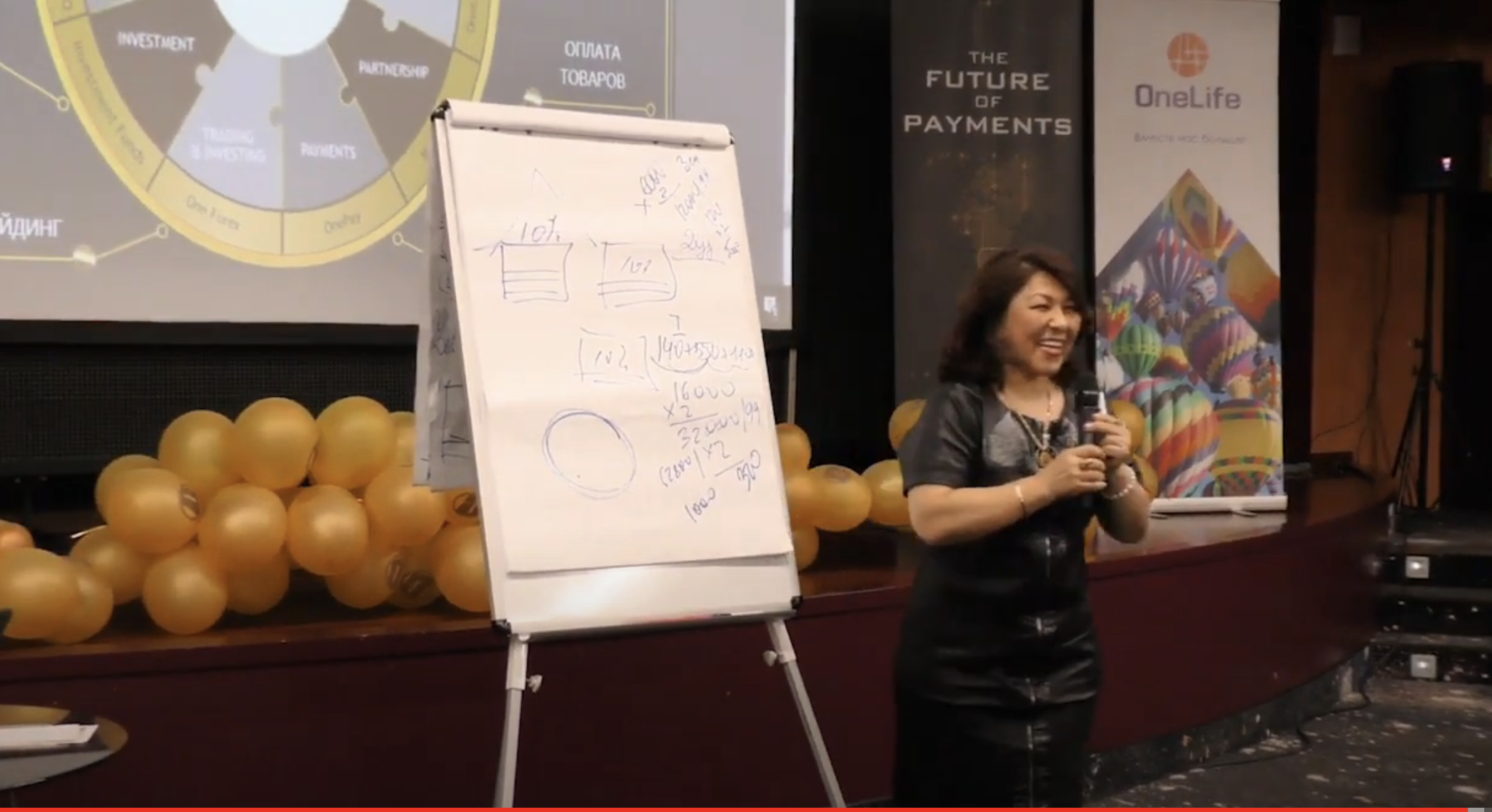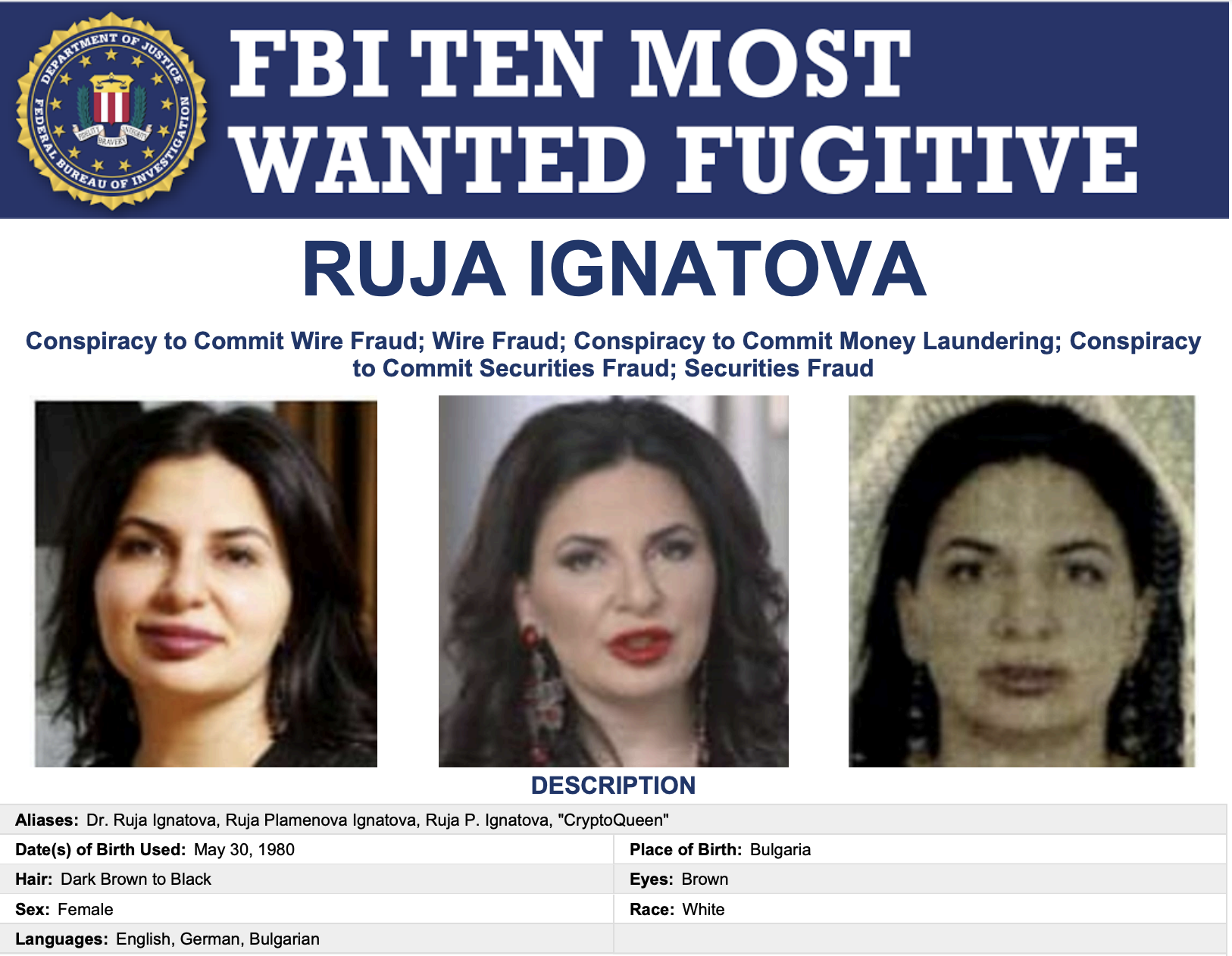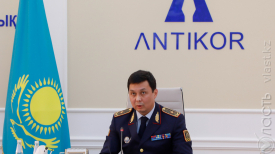- ВКонтакте
- РћРТвЂВВВВВВВВнокласснРСвЂВВВВВВВВРєРСвЂВВВВВВВВ
Paolo Sorbello, Olga Loginova, Vlast.
This piece was adapted from an OCCRP article with additional reporting from Vlast.
Осы мақаланың қазақша нұсқасын оқыңыз.
Читайте этот материал на русском.
In April 2017, Dilbar Mirsaitova was sent to pre-trial detention on suspicion of fraud in Kazakhstan. She was accused of illicitly acquiring at least 2.2 billion tenge (then worth around $7 million) from investors in the OneCoin scam.
At the time, the prosecutor’s accusations were stark:
“Mirsaitova D.K. and her accomplices set up a vast network of company agents, who, across all regions of the country, were intentionally deceiving investors by pretending to be independent marketing partners of Bulgarian company OneLife, claiming exceptional value of the so-called cryptocurrency OneCoin, sold by them.”
A few days later, however, Mirsaitova started posting from her Facebook account, signaling that she had been freed.
The Financial Monitoring Agency’s investigative department told Vlast in a letter that the investigation into the OneLife scam had been closed. OneLife was the company behind the OneCoin “virtual currency”.
Several YouTube videos and social media posts link Mirsaitova’s participation in what amounted to a global financial pyramid, in which investors poured money into a virtual currency which was not in fact backed by a blockchain and led to a large-scale fraud.
The victims of the scam in Kazakhstan had tried to sue Mirsaitova and some of her alleged associates in 2019, to no avail. An online petition from 2021 shows that their attempts to retrieve the money they had invested had fallen on deaf ears and could not move forward.
Since her charges were dropped, Mirsaitova has traveled back and forth to Dubai, according to her social media accounts.
According to a data leak, part of the #DubaiUnlocked project, since at least 2020 Mirsaitova has owned a $123,000 flat in the Sky Bay, a self-described “four star lifestyle hotel” in Dubai. Mirsaitova, who resides in the southern Kazakhstan city of Shymkent, still owns the Sky Bay flat.
While it is unclear when exactly she made the purchase in Dubai, her links to Ruja Ignatova, the alleged mastermind behind the OneCoin scandal, are straightforward. And Ignatova, who was nicknamed “Cryptoqueen” in a BBC documentary, has a lot of connections in Dubai too.

Mirsaitova next to Ignatova (left), posing before the OneCoin logo in August 2016. From Mirsaitova's Facebook photos.
A Preventable Scam
At the height of the blockchain hype, Ignatova and Frank Schneider, a former intelligence officer in Luxembourg, worked together to exploit the OneCoin scam. In 2019, Schneider was charged in New York with conspiracy to commit wire fraud and money laundering for his role in OneCoin. But the existence of the case against him was only made public in April 2021 when he was detained in France to face extradition to the US.
Both Schneider and Ignatova had purchased luxury properties in Dubai, the #DubaiUnlocked investigation revealed. The former had owned a $2 million apartment since 2018, while the latter had bought a penthouse in 2015 in the same gated community. When they sold this property they had already been charged with criminal offenses following OneCoin’s collapse, raising questions over Dubai’s enforcement of anti-money laundering rules.
Ignatova and Schneider were able to carry out the real estate deals despite a United Arab Emirates law in place since 2019 that requires realtors to run background checks on buyers and sellers of properties, and report any suspicious transactions to authorities.
Ignatova had purchased her 500-square-meter apartment through a shell company. A title deed obtained by OCCRP’s partner, paper trail media, shows the company sold the property in December 2019, by which time Ignatova was wanted by prosecutors in New York — and possibly even dead.
Schneider had already been detained when his Palm Jumeirah flat sold for $2.3 million in January 2022.
The OneCoin catastrophe was well-known by the time the properties were sold off. Numerous media reports quoted victims describing in detail how Ignatova had duped them into buying her fake cryptocurrency.
Alexander Yearsley, managing director of Edinburgh-based Martello Risk, who has conducted financial investigations and forensic auditing on Dubai, said a lack of enforcement had helped earn the UAE a reputation as a safe place to stash the proceeds of criminal activity.
“You’ve got the fact that there is an unbelievably light touch to regulation –– if you want to call it regulation. You literally can get away with whatever you want,” Yearsley said. “If the price is right, the politics don’t bother them.”
UAE officials — including at the ministries of interior, economy, and justice — and Dubai Police did not respond to detailed questions from reporters involved in the #DubaiUnlocked project about the sale of properties belonging to Ignatova and Schneider.
The Great Escape
Schneider never was extradited to the US. In May 2023 he launched a daring escape from house arrest and disappeared.
An FBI spokesperson told OCCRP that Schneider “remains a fugitive.” But journalists discovered new clues linking Schneider to Indonesia, which does not have an extradition treaty with the US.
Ignatova too has disappeared without trace. While OCCRP’s Bulgarian media partner, Bird, reported in February 2023 that Ignatova was likely murdered, her death has never been confirmed. In 2022, the FBI declared Ignatova, who was born in Bulgaria and became a German citizen, one of its most wanted fugitives.
An FBI spokesperson said in an email that the agency “is aware of media reports regarding Ruja Ignatova’s death, however, until there is documented evidence that she is dead, the FBI considers Ignatova as alive, and she remains on the FBI Top 10 Most Wanted List.”
Meanwhile, Ignatova’s OneCoin co-founder, Karl Sebastian Greenwood, pleaded guilty to wire fraud and money laundering. In September 2023 he was sentenced to 20 years in prison, and ordered to forfeit $300 million.
When OneCoin appeared in 2014, Greenwood and Ignatova hyped it as a cryptocurrency to rival the wildly-successful Bitcoin. But it was all a lie.
“Unlike legitimate cryptocurrencies, OneCoin had no actual value and was conceived of by Greenwood and Ignatova as a fraud from day one,” the New York Southern District US Attorney’s Office said in a statement announcing Greenwood’s sentencing.
The deceit included simulating transactions through a fake blockchain, which was meant to function as a “digital ledger identifying OneCoins and recording historical transactions,” said the prosecutors. They added that “in reality, OneCoin lacked a true blockchain.”
But at least 3.5 million people around the world, including Kazakhstan, bought into the OneCoin dream. For almost all of them, the investment became a nightmare.
Поддержите журналистику, которой доверяют.










